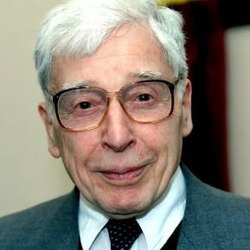Sir Robert Geoffrey Edwards, CBE, FRS (27 September 1925 – 10 April 2013) was an English physiologist and pioneer in reproductive medicine, and in-vitro fertilisation (IVF) in particular. Along with the surgeon Patrick Steptoe, Edwards successfully pioneered conception through IVF, which led to the birth of Louise Brown on 25 July 1978. They founded the first IVF program for infertile patients and trained other scientists in their techniques. Edwards was the founding editor-in-chief of Human Reproduction in 1986. In 2010, Edwards was awarded the Nobel Prize in Physiology or Medicine "for the development of in vitro fertilization.

Edwards was born in Batley, Yorkshire, and attended Manchester Central High School on Whitworth Street in central Manchester, after which he served in the British Army, and then completed his undergraduate studies in biology at Bangor University. He studied at the Institute of Animal Genetics and Embryology at the University of Edinburgh, where he was awarded a PhD in 1955. After a year as a postdoctoral research fellow at the California Institute of Technology he joined the scientific staff of the National Institute for Medical Research at Mill Hill. After a further year at the University of Glasgow, in 1963 he moved to the University of Cambridge as Ford Foundation Research Fellow at the Department of Physiology, and a member of Churchill College, Cambridge. He was appointed Reader in physiology in 1969.
Circa 1960 Edwards started to study human fertilisation, and he continued his work at Cambridge, laying the groundwork for his later success. In 1968 he was able to achieve fertilisation of a human egg in the laboratory and started to collaborate with Patrick Steptoe, a gynecologic surgeon from Oldham. Edwards developed human culture media to allow the fertilisation and early embryo culture, while Steptoe utilized laparoscopy to recover ovocytes from patients with tubal infertility. Their attempts met significant hostility and opposition, including a refusal of the Medical Research Council to fund their research and a number of lawsuits. Additional historical information on this controversial era in the development of IVF has been published.
The birth of Louise Brown, the world's first 'test-tube baby', at 11:47 pm on 25 July 1978 at the Oldham General Hospital made medical history: in vitro fertilisation meant a new way to help infertile couples who formerly had no possibility of having a baby.
Refinements in technology have increased pregnancy rates and it is estimated that in 2010 about 4 million children have been born by IVF, with approximately 170,000 coming from donated oocyte and embryos. Their breakthrough laid the groundwork for further innovations such as intracytoplasmatic sperm injection ICSI, embryo biopsy (PGD), and stem cell research.
Edwards and Steptoe founded the Bourn Hall Clinic as a place to advance their work and train new specialists. Steptoe died in 1988. Edwards continued on in his career as a scientist and an editor of medical journals.
Edwards received numerous honours and awards including:
Edwards was elected as a Fellow of the Royal Society (FRS) in 1984.
In 1994, Doctor Honoris Causa, University of Valencia (Spain).
In 2001, he was awarded the Albert Lasker Clinical Medical Research Award by the Lasker Foundation "for the development of in vitro fertilization, a technological advance that has revolutionized the treatment of human infertility."
In 2007, he was ranked 26th in The Daily Telegraph's list of 100 greatest living geniuses.
In 2007, he was awarded an honorary doctorate from the University of Huddersfield.
On 4 October 2010, it was announced that Edwards had been awarded the 2010 Nobel Prize in Physiology or Medicine for the development of in-vitro fertilization. The Nobel Committee praised him for advancing treatment of infertility and noted that IVF babies have similar health statuses to ordinary babies. Göran K. Hansson, secretary of the Nobel Assembly at the Karolinska Institutet in Stockholm, announced the news. The first child of IVF Louise Brown described the award as "fantastic news". A Vatican official condemned the move as "completely out of order". As mentioned by Simon Fishel “In December 2010, at the Nobel awards ceremony that was full of pathos in Bob’s absence, these precious words were spoken, ‘‘In the absence of this year’s Nobel Laureate in Physiology or Medicine, I ask Professor Edwards’ wife and long-term scientific companion, Dr Ruth Fowler Edwards, to come forward and receive his Prize from the hands of His Majesty the King’’.”Edwards was knighted in the 2011 Birthday Honours for services to human reproductive biology
No comments:
Post a Comment